情态动词must和should
情态动词can, may, must, should区别
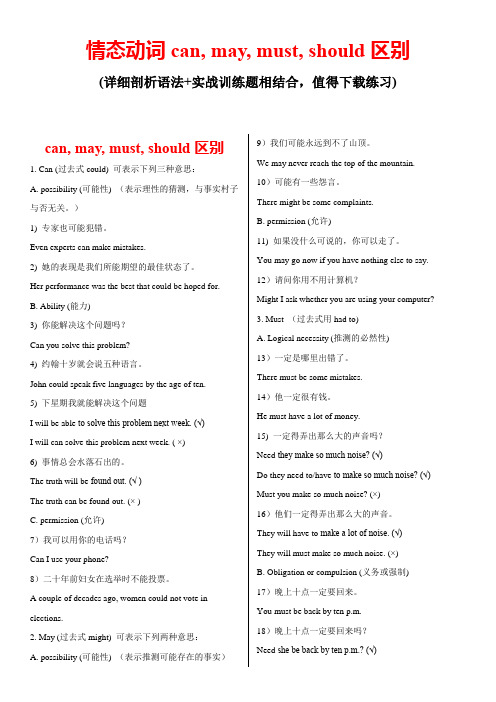
情态动词can, may, must, should区别(详细剖析语法+实战训练题相结合,值得下载练习)can, may, must, should区别1. Can (过去式could) 可表示下列三种意思:A. possibility (可能性) (表示理性的猜测,与事实村子与否无关。
)1) 专家也可能犯错。
Even experts can make mistakes.2) 她的表现是我们所能期望的最佳状态了。
Her performance was the best that could be hoped for.B. Ability (能力)3) 你能解决这个问题吗?Can you solve this problem?4) 约翰十岁就会说五种语言。
John could speak five languages by the age of ten.5) 下星期我就能解决这个问题I will be able to solve this problem next week. (√)I will can solve this problem next week. ( ×)6) 事情总会水落石出的。
The truth will be found out. (√ )The truth can be found out. (× )C. permission (允许)7)我可以用你的电话吗?Can I use your phone?8)二十年前妇女在选举时不能投票。
A couple of decades ago, women could not vote in elections.2. May (过去式might) 可表示下列两种意思:A. possibility (可能性) (表示推测可能存在的事实)9)我们可能永远到不了山顶。
We may never reach the top of the mountain. 10)可能有一些怨言。
should 与must 辨析
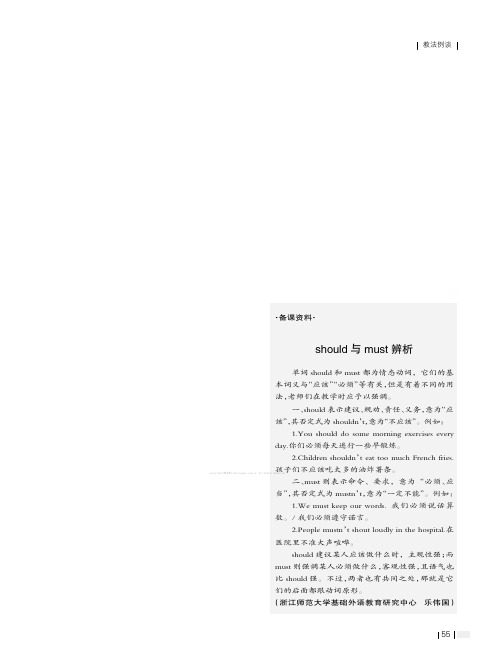
教法例谈
·备课资料·
should与must辨析
单词should和must都为情态动词,它们的基
“必须”等有关,但是有着不同的用
本词义与“应该”
法,老师们在教学时应予以强调。
一、should表示建议、规劝、责任、义务,意为“应
该”,其否定式为shouldn’t,意为“不应该”。
例如:
1.You should do some morning exercises every
day.你们必须每天进行一些早锻炼。
2.Children shouldn’t eat too much French fries.
孩子们不应该吃太多的油炸薯条。
Copyright©博看网 . All Rights Reserved.
二、must则表示命令、要求,意为“必须、应
当”,其否定式为mustn’t,意为“一定不能”。
例如:
1.We must keep our words.我们必须说话算
数。
/我们必须遵守诺言。
2.People mustn’t shout loudly in the hospital.在
医院里不准大声喧哗。
should建议某人应该做什么时,主观性强;而
must则强调某人必须做什么,客观性强,且语气也
比should强。
不过,两者也有共同之处,那就是它
们的后面都跟动词原形。
(浙江师范大学基础外语教育研究中心乐伟国)
55。
shall,must,should的区别

shall, must , should表示”要”””不要”时的区别
当我们对别人要求,命令,教育,劝告时,常用到“你一定要....”“你应当.....””你要......””你别…”等句型,我们就应该想起用情态动词或者祈使句。
要求,命令,教育,劝告时,我们应该用shall,must,还是用should好呢?这是令老师和学生都混淆难弄的. 好象个个都差不多,用那个都可以。
其实是有区别的。
我这里给大家一个判别技巧:一.表示命令,”你非得这样不可”不容商量逃避否定的,命令语气非常强的,必须要用shall,shall not . 如:You shall marry me .You shall not enter my house! .二.表示纪律要求,规章制度要求,要用must,mustn’t如”你不要迟到,””你要靠右走.””你不要在这抽烟.”都是纪律要求,要用mustn’t,不能用shouldn’t .三.表示道德要求,婉转的教育,劝说,是语气最轻的,受教育者可以听,也可以不听,全凭个人认识,个人意愿喜爱,个人道德规范决定的个人行为。
如“你要多吃青菜。
”“你要听老婆的话。
”“你不要吃那么多肉。
”“你要先洗手后吃饭。
”等,就应该用should,shouldn’t.下面请抓住:不容抗拒的命令用shall,shall not,公众纪律要求must,mustn’t,婉转教育劝告用should,shouldn’t这条主线技巧进行练习。
1.你要马上跟我回家,马上离开网吧。
2.你要多读读英语小说。
你不要一个字一个字指着读,要一目十行。
3.你不要闯红灯。
4.你要准时到这。
最新中考情态动词讲解之can,may,must,should区别
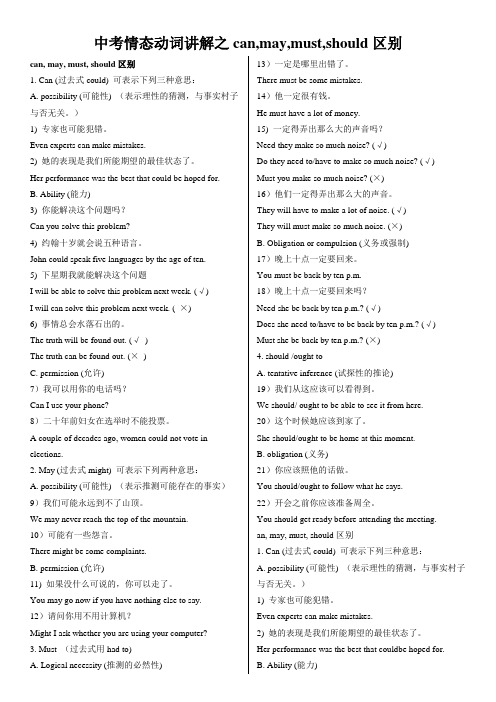
中考情态动词讲解之can,may,must,should区别can, may, must, should区别1. Can (过去式could) 可表示下列三种意思:A. possibility (可能性) (表示理性的猜测,与事实村子与否无关。
)1) 专家也可能犯错。
Even experts can make mistakes.2) 她的表现是我们所能期望的最佳状态了。
Her performance was the best that could be hoped for.B. Ability (能力)3) 你能解决这个问题吗?Can you solve this problem?4) 约翰十岁就会说五种语言。
John could speak five languages by the age of ten.5) 下星期我就能解决这个问题I will be able to solve this problem next week. (√)I will can solve this problem next week. ( ×)6) 事情总会水落石出的。
The truth will be found out. (√)The truth can be found out. (×)C. permission (允许)7)我可以用你的电话吗?Can I use your phone?8)二十年前妇女在选举时不能投票。
A couple of decades ago, women could not vote in elections.2. May (过去式might) 可表示下列两种意思:A. possibility (可能性) (表示推测可能存在的事实)9)我们可能永远到不了山顶。
We may never reach the top of the mountain.10)可能有一些怨言。
ought,should,must,have to,need的区别

ought,should,must,have to,need的区别ought的各种形式ought是情态动词。
ought没有其他形式,可用于现在时以及将来时。
用于过去时则位于动词过去式之后或不定式的完成式之前:I ought to write to him today/tomorrow.我今天/明天应该给他写封信。
I knew I ought to write to him.我那时知道我应该给他写封信。
She said I ought to write.她说我应该写。
I know/knew that I ought to have written.我知道/那时知道我该写的。
否定式:ought not/oughtn't疑问式:ought I?等否定疑问式:ought I not?/oughtn't I?等ought与带to的不定式连用。
为了提醒学生这一点,常称之为ought to。
问句或话语中用ought to的时候,可以用should来回答;用should的问句或话语也可以用ought to回答:—You ought to put in central heating.—Yes,I suppose I should.—你应该装上暖气。
—是的,我应该装。
should的各种形式should也是情态动词。
与ought的各种形式相同,should可用于现在时以及将来时。
如位于动词过去式之后时,也可以用于过去时。
在上文的各例句中should可代替ought to使用。
否定式:should not/shouldn't疑问式:should I?等否定疑问式:should I not?/shouldn't I?等should后面带没有to的不定式(即动词原形)。
should和ought用于表示义务时通常意思是同样的,但should 是较为常用的形式。
在会话中should/ought to常可单独使用,此时动词不定式省略而不说出:—You should paint/ought to paint your door.—Yes,I know I should/I know I ought to.—你应当油漆—下你的门。
should同义句
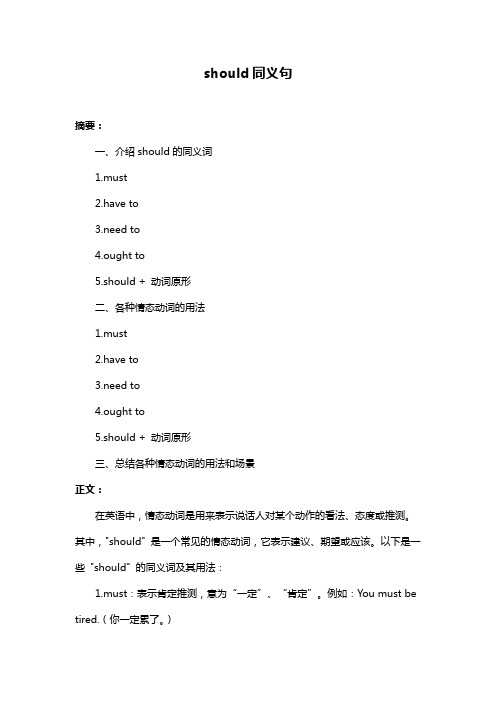
should同义句摘要:一、介绍should的同义词1.must2.have to3.need to4.ought to5.should + 动词原形二、各种情态动词的用法1.must2.have to3.need to4.ought to5.should + 动词原形三、总结各种情态动词的用法和场景正文:在英语中,情态动词是用来表示说话人对某个动作的看法、态度或推测。
其中,"should" 是一个常见的情态动词,它表示建议、期望或应该。
以下是一些"should" 的同义词及其用法:1.must:表示肯定推测,意为“一定”、“肯定”。
例如:You must be tired.(你一定累了。
)2.have to:表示客观规定,意为“必须”、“不得不”。
例如:I have to finish my homework.(我必须完成我的家庭作业。
)3.need to:表示主观需要,意为“需要”。
例如:I need to buy some food.(我需要买一些食物。
)4.ought to:表示道义责任,意为“应该”。
例如:You ought to help others.(你应该帮助别人。
)5.should + 动词原形:表示建议或期望,意为“应该”。
例如:You should study hard.(你应该努力学习。
)在实际使用中,各种情态动词都有各自特定的用法和场景。
例如:- must 用于肯定推测,表示对某事非常有把握;- have to 表示受客观规定限制,通常与must 替换使用;- need to 表示主观需求,强调必要性;- ought to 表示道义责任,用于批评或责备;- should + 动词原形用于建议或期望,表示一种较为正式的语气。
总之,在英语中,情态动词是表示说话人对某个动作的看法、态度或推测的重要手段。
情态动词shouldmustmight
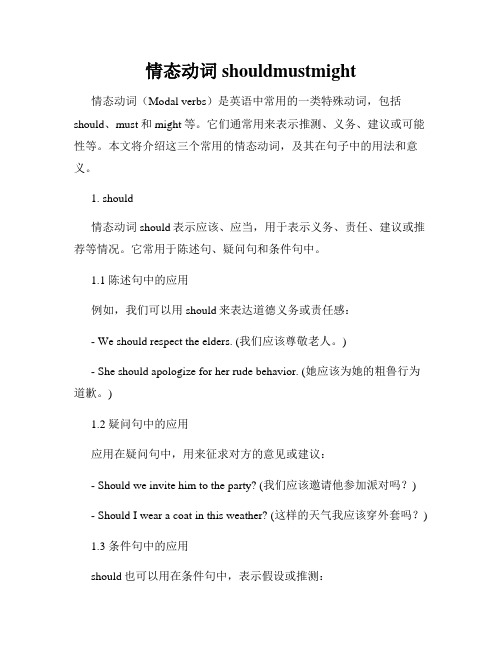
情态动词shouldmustmight情态动词(Modal verbs)是英语中常用的一类特殊动词,包括should、must和might等。
它们通常用来表示推测、义务、建议或可能性等。
本文将介绍这三个常用的情态动词,及其在句子中的用法和意义。
1. should情态动词should表示应该、应当,用于表示义务、责任、建议或推荐等情况。
它常用于陈述句、疑问句和条件句中。
1.1 陈述句中的应用例如,我们可以用should来表达道德义务或责任感:- We should respect the elders. (我们应该尊敬老人。
)- She should apologize for her rude behavior. (她应该为她的粗鲁行为道歉。
)1.2 疑问句中的应用应用在疑问句中,用来征求对方的意见或建议:- Should we invite him to the party? (我们应该邀请他参加派对吗?) - Should I wear a coat in this weather? (这样的天气我应该穿外套吗?)1.3 条件句中的应用should也可以用在条件句中,表示假设或推测:- If I were you, I should take the job offer. (如果我是你,我会接受这份工作。
)- Should it rain tomorrow, we will have to cancel the picnic. (如果明天下雨,我们将不得不取消野餐。
)2. must情态动词must表示必须、务必,用于表示强制、义务或肯定的命令等情况。
它通常用于陈述句、疑问句和否定句中。
2.1 陈述句中的应用常用于陈述句中表示必须遵守的规则或规定:- Students must wear a uniform at school. (学生必须在学校穿制服。
) - We must submit the report by tomorrow. (我们必须在明天前提交报告。
近义词辨析-------ought,should,must,haveto,need表示义务

近义词辨析-------ought,should,must,have to,need表示义务must和have to的各种形式A mustmust是情态动词。
(参见第107节B。
)它用于现在时和将来时。
否定式:must not/mustn't疑问式:must I?等否定疑问式:must I not?/mustn't I?等过去时用had to代替。
must与不带to的不定式(即动词原形)连用。
它可表示义务和语气较强的劝告:Father:You must get up earlier in the morning.父亲:你早晨必须起早一点。
(义务)You must take more exercise.Join a squash club.你应该多锻炼。
参加一个壁球俱乐部吧。
(劝告)B have tohave to(不带got)与否定式don't/doesn't have to是表示习惯性行动的正确形式,但也可以用于表示一次性行动。
在美国英语中是普遍使用的。
have(got)to和haven't(got)to只用于表示一次性行动:Tom:I have to go to work every day except Sunday.But I don't have towork a full day on Saturday.汤姆:除了星期天外我必须每天去上班,但星期六我不必干一整天。
但在星期天他可以说:I'm glad I haven't(got to go to work today./I'm glad I don't have to go to work today.我真高兴,今天不必上班。
过去式didn't have to既可表示过去的习惯,也可表示一次性行动。
hadn't(got)to多用于表示一次性行动。
情态动词should,may must等用法

Should的用法:1.(shall的过去式,表示过去将来)将会We hoped that we should be able to do that. 我们希望我们能这样做。
★2. should 作为情态动词,可以用在条件状语从句中,表示语气较强的假设,译作“万一”,这时也可将should 置于从句之首,即将should 放在主语前面,而省略从属连词if .例如:◆If you should fail to come,ask Mrs Chen to work in your place. (= Should you fail to come,ask Mrs Chen to work in your place. )万一你来不了,就叫陈夫人代替你。
◆If anyone should come,say I am not at home. (= Should anyone come,say I am not at home. )万一有人来访,就说我不在家。
◆If it should rain tomorrow,I wouldn't go.(= Should it rain tomorrow,I wouldn't go.)◆If the car should break down on the way, you would haveto walk back.◆Ask her to ring me up if you should see her.万一汽车中途抛锚,你就得走回来。
★3.(表示可能性、推测、推论或期待)可能;(按理)应该She should be here any minute.她该马上就到。
Dinner should be ready by now.此刻晚饭应该做好了。
★4.(表示义务、责任)应该,应当You should do as she says.你应当照她说的去做。
情态动词should, ought to, have to, must

表示“应该”和“必须”的情态助动词should, ought to, have to 与must(1)表示不可逃避的义务或表示“必须”的must。
must通常只用于现在时和将来时,其他时态则用have to代替。
have to比must往往更强调客观的要求或外在的原因:In the play, she must appear in a bright red dress and long black stockings.演出时她必须穿一条鲜红色的裙子和黑色的长筒袜。
Last year in another play, she had to wear short socks and a bright, orange-coloured dress.去年在演另一个剧时,她不得不穿短袜和一件鲜艳的橘红色的衣服。
(2)should 和ought to都可译为“应该”,表示义务、责任或某个正确的行为。
ought to 比should语气略强些,多用于肯定句;疑问句与否定结构则多用should。
与它们相比,must 和have to 的语气要强得多,没有选择余地:must和have to表示“必须”,而should和ought to表示“责任”、“义务”或是“一个正确的行动”。
试比较:I can’t go to the cinema tonight; I must (or have to) write some letters.今晚我不能去看电影,我必须写几封信。
(我没有选择,我必须而且将会写这些信。
)I should (or ought to) do some work tonight, but I think I shall go to the cinema instead.今晚我应当做一些工作,不过我想我会去看电影的。
(对我来说,正确的做法是工作,但是我选择了去看电影。
)(3)had to表示“过去的必须”,表示过去必须做某事。
must should can shall may 的运用

must should can shall may 的运用“must”、“should”、“can”、“shall”和“may”是英语中常用的情态动词,它们各自具有特定的用法和含义。
以下是关于这五个情态动词的详细解释和运用:1.must:表示“必须”或“一定”。
它通常用于表达强烈的义务感或肯定性的推测。
表示义务:You must finish your homework before going out. (你必须在出去玩之前完成作业。
)表示推测:He must be the manager, given his authority. (鉴于他的权威,他一定是经理。
)2.should:意为“应该”,用于表达建议、义务或推测。
表示建议:You should take a break after studying for a long time. (长时间学习后,你应该休息一下。
)表示义务:Children should respect their elders. (孩子应该尊敬长辈。
)表示推测:They should arrive by noon. (他们应该会在中午到达。
)3.can:表示“能力”或“可能性”。
它常用于表达某人具备做某事的能力或某事发生的可能性。
表示能力:I can speak three languages. (我会说三种语言。
)表示可能性:Can you help me with this problem? (你能帮我解决这个问题吗?)4444shall:通常用于第一人称(I, we)的将来时,表示“将要”或“应该”。
在疑问句中,它可以用来征求对方的意见或提出建议。
表示将来:I shall meet you at the station tomorrow. (我明天会在车站接你。
)征求意见:Shall we go for a walk? (我们去散步好吗?)may:表示“许可”或“可能性”。
情态动词 must、have to、should相同点和不同点

情态动词must、have to、should相同点和不同点第一部分must 与have tomust 与have to 都表示“必须”、“一定”要去做某事1、must 的“必须”是你个人觉得的,你觉得必须要做,那就必须要去做,你也可以觉得它没必要I must say “hello”to her.我一定要对她说你好对她说你好是不是必须要做,由你自己来决定have to 的“必须”是由周围条件决定的,不是由你自己决定的,不管你怎么样认为,这个都是必须要做的I have to take lessons now.我现在必须要上课了不管你觉得是不是必须要上课,你现在都必须要去口语里说“必须”、“一定”的时候,通常用have to ,而不用mustmust多用于书面语和正式的交谈时I must finish it. (口语很少用)I have to finish it (口语常用)我一定要完成这个You must work hard (口语很少用)You have to work hard (口语常用)你一定要努力工作表达“必须”、“一定”要去做某事的时候:口语中,用must会显得很正式,并且很奇怪,因此在口语中用have to 肯定不会错但是,口语中must 也会经常用,这时候must是“表猜测、建议”等意思Tom was absent from school today. He must be ill.You must read this book. It's so interesting.第二部分mustn't 与don't have tomust的否定是mustn't = must nothave to 的否定是:don't have to = do not have tomust 与have to 的意思相近但是它们的否定形式,意思则完全不同mustn't 表示“不能”、“禁止”、“不允许”做某事You mustn't speak loudly here.这儿你不能大声讲话Mustn't take photoes at the museum.博物馆不允许拍照和must一样,mustn't在口语中也很少用,通常我们会用can't = can notYou mustn't speak loudly here. (不常用)You can't speak loudly here. (常用)这儿你不能大声讲话Mustn't take photoes at the museum. (不常用)Can't take photoes at the museum. (常用)博物馆不允许拍照don't have to=needn't 表示“没必要”,“不需要”做某事don't have to 在口语中经常会用到You don't have to work so early.=You needn't work so early.你没必要这么早就工作You don't have to finish this today.=You needn't finish this today.你不需要今天做完这个第三部分must、have to 与shouldmust 与have to 表示“必须”、“一定”要去做某事,没得选择,只能去做should 表示“应该”去做某事,只是一种建议或观点,有选择,做不做在于你自己I have to go to bed early.我必须要早睡I should go to bed early.我应该要早睡I have to get up early.我必须要早起I should get up early.我应该要早起must 与have to 也可以表示建议这种建议很强烈,一般说话这略显激动should 表示的建议则很平淡,中性化You must try the car, it's so cool.You have to try the car, it's so cool你一定要试试这辆车,太酷了I should try the car.我应该试试这辆车。
情态动词can must should的用法

情态动词是一类特殊的动词,它们表示说话人的态度、观点或推测,而不是描述具体的行为或动作。
以下是情态动词"can"、"must"和"should"的常见用法:
1. **Can**:
- 表示能力:"I can speak English."(我会说英语。
)
- 表示许可:"You can use my computer."(你可以使用我的电脑。
) - 表示可能性:"It can be rainy tomorrow."(明天可能会下雨。
)
2. **Must**:
- 表示必要性:"You must study hard."(你必须努力学习。
)
- 表示推测:"He must be tired."(他一定很累了。
)
3. **Should**:
- 表示建议或责任:"You should drink more water."(你应该多喝水。
) - 表示推测:"It should be sunny today."(今天应该是晴天。
)
需要注意的是,情态动词的使用会因语境和说话人的语气而有所不同。
此外,这些情态动词还有其他一些用法,具体取决于上下文和语言习惯。
情态动词表推测的口诀

情态动词表推测的口诀在日常生活中,我们常常需要用英语进行推测,此时就需要借助情态动词。
情态动词在表示推测时,有较强的语气助词作用,能表达说话者对某件事情的猜测或推测。
下面我们将学习一些常用的推测性情态动词及其用法。
一、推测性情态动词的分类和含义1.肯定推测:can、could、may、might、must、should等。
2.否定推测:can"t、couldn"t、may not、might not、mustn"t、shouldn"t等。
二、情态动词表推测的口诀1.肯定推测:can、could、may、might、must、should口诀:肯定推测用yes,can、could、may、might、must、should解忧愁。
2.否定推测:can"t、couldn"t、may not、might not、mustn"t、shouldn"t口诀:否定推测别慌张,can"t、couldn"t、may not、might not、mustn"t、shouldn"t来帮忙。
三、实例分析与应用1.肯定推测例句:He can be the one who saved her.他可能是救她那个人。
You might know the answer.你可能知道答案。
2.否定推测例句:She can"t have done that.她不可能做过那件事。
He shouldn"t be late.他不应该迟到。
掌握这些推测性情态动词,并在实际交流中灵活运用,能帮助我们更准确地表达猜测和推测。
表推测的情态动词

3. “can/could not +have +done”“过 去 不可能做了某事” 她不能去你家,她不知道你的地址。 eg. She can not have been to your house;she does not know your address.
4. may/might have done“过去或许做 过某事” may/might not have done “过去或 许 没有做过某事” eg. I can’t find my key, I might have left it at home. He might not have got your letter.
二.“情态动词+have done” 的用法。 1.must have done “过去一定做了某事” 表示对过去的一种肯定性推测。 eg. She must have gone by bus. It must have rained last night, for the road is quite muddy.
2. can/could have+done“过去可能 做了某事”, “could have+done”也可表示‘‘过 去本可以做某事但实际上却没有做” eg. He was not at home last night, he could have gone to the cinema. I could have finished my homework last night, but I was too sleepy.
5.ought to/should have done,”表示本应该 做某事,而事实上并没有做”。 否定句表示“ 本不该做某事而实际上做 了”。 你在实验中本应该更仔细些的 You ought to/should have been more careful in this experiment. 他不应该把那些旧衣服扔了。 He ought not to have thrown the old clothes away.
语法中的情态动词与情态动词的否定形式
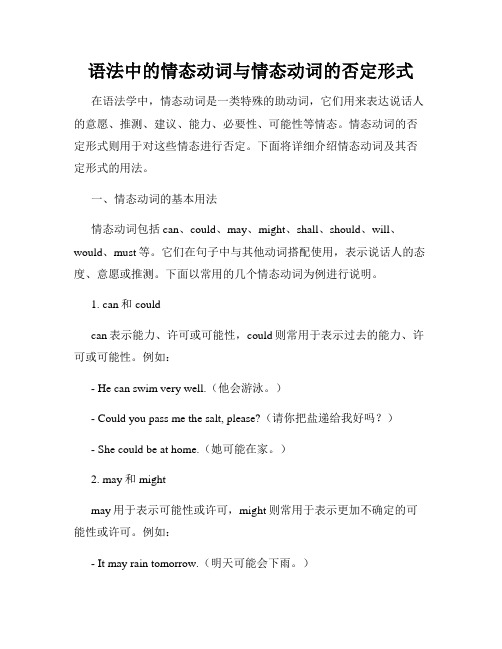
语法中的情态动词与情态动词的否定形式在语法学中,情态动词是一类特殊的助动词,它们用来表达说话人的意愿、推测、建议、能力、必要性、可能性等情态。
情态动词的否定形式则用于对这些情态进行否定。
下面将详细介绍情态动词及其否定形式的用法。
一、情态动词的基本用法情态动词包括can、could、may、might、shall、should、will、would、must等。
它们在句子中与其他动词搭配使用,表示说话人的态度、意愿或推测。
下面以常用的几个情态动词为例进行说明。
1. can和couldcan表示能力、许可或可能性,could则常用于表示过去的能力、许可或可能性。
例如:- He can swim very well.(他会游泳。
)- Could you pass me the salt, please?(请你把盐递给我好吗?)- She could be at home.(她可能在家。
)2. may和mightmay用于表示可能性或许可,might则常用于表示更加不确定的可能性或许可。
例如:- It may rain tomorrow.(明天可能会下雨。
)- I might go to the party if I finish my work early.(如果我早点完成工作,我可能会去参加聚会。
)3. will和wouldwill表示意愿、决心或将来的行为,would常用于表示过去的意愿或假设。
例如:- I will help you with your project.(我会帮你完成项目。
)- He said he would buy me a gift.(他说他会给我买礼物。
)4. mustmust表示必须或推测的强烈可能性。
例如:- You must finish your homework before going out to play.(你必须在出去玩之前完成作业。
)- It's raining heavily, they must be staying at home.(天下着大雨,他们一定在家里。
情态动词的否定式

情态动词的否定式情态动词是用来表示说话人对某种行为或状态的看法、态度或推测的一类动词。
在英语中,情态动词包括can、could、may、might、will、would、shall、should、must、ought to。
当我们在使用情态动词时,有时需要表达否定的意思。
下面是一些常见的情态动词的否定形式及其用法。
1. can't: 表示"不能"或"不会"例句:- She can't swim. (她不会游泳。
)- I can't come to the party tonight. (我今晚不能来参加聚会。
)2. couldn't: 表示"不能"或"不会"(过去时)例句:- I couldn't find my keys this morning. (今天早上我找不到我的钥匙。
)- He couldn't understand the instructions. (他不能理解这些说明。
)3. may not: 表示"可能不"或"不可能"例句:- It may not rain tomorrow. (明天可能不会下雨。
)- You may not enter without a ticket. (没有票,你可能不被允许进入。
)4. might not: 表示"可能不"或"不可能"(更加不确定)例句:- She might not come to the meeting. (她可能不会来参加会议。
)- I might not be able to finish the project on time. (我可能无法按时完成这个项目。
)5. will not/won't: 表示"不会"或"将不会"例句:- He will not be able to attend the meeting tomorrow. (他明天不会能够出席会议。
情态动词can, may, must, should区别

情态动词can, may, must, should区别(详细剖析语法+实战训练题相结合,值得下载练习)can, may, must, should区别1. Can (过去式could) 可表示下列三种意思:A. possibility (可能性) (表示理性的猜测,与事实村子与否无关。
)1) 专家也可能犯错。
Even experts can make mistakes.2) 她的表现是我们所能期望的最佳状态了。
Her performance was the best that could be hoped for.B. Ability (能力)3) 你能解决这个问题吗?Can you solve this problem?4) 约翰十岁就会说五种语言。
John could speak five languages by the age of ten.5) 下星期我就能解决这个问题I will be able to solve this problem next week. (√)I will can solve this problem next week. ( ×)6) 事情总会水落石出的。
The truth will be found out. (√ )The truth can be found out. (× )C. permission (允许)7)我可以用你的电话吗?Can I use your phone?8)二十年前妇女在选举时不能投票。
A couple of decades ago, women could not vote in elections.2. May (过去式might) 可表示下列两种意思:A. possibility (可能性) (表示推测可能存在的事实)9)我们可能永远到不了山顶。
We may never reach the top of the mountain. 10)可能有一些怨言。
情态动词等级
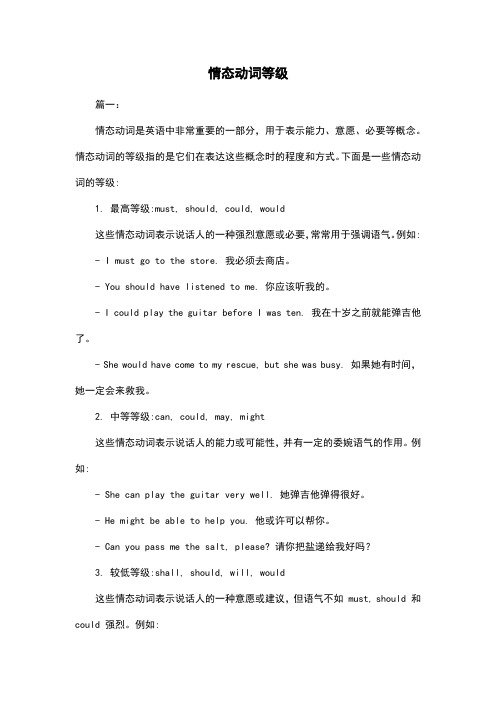
情态动词等级篇一:情态动词是英语中非常重要的一部分,用于表示能力、意愿、必要等概念。
情态动词的等级指的是它们在表达这些概念时的程度和方式。
下面是一些情态动词的等级:1. 最高等级:must, should, could, would这些情态动词表示说话人的一种强烈意愿或必要,常常用于强调语气。
例如: - I must go to the store. 我必须去商店。
- You should have listened to me. 你应该听我的。
- I could play the guitar before I was ten. 我在十岁之前就能弹吉他了。
- She would have come to my rescue, but she was busy. 如果她有时间,她一定会来救我。
2. 中等等级:can, could, may, might这些情态动词表示说话人的能力或可能性,并有一定的委婉语气的作用。
例如:- She can play the guitar very well. 她弹吉他弹得很好。
- He might be able to help you. 他或许可以帮你。
- Can you pass me the salt, please? 请你把盐递给我好吗?3. 较低等级:shall, should, will, would这些情态动词表示说话人的一种意愿或建议,但语气不如 must, should 和could 强烈。
例如:- He shall be rewarded for his good work. 他将因为他的出色工作而受到奖励。
- You should have called me earlier. 你应该早些时候给我打电话。
- I will help you if I can. 如果我能帮上忙,我会帮你。
4. 最低等级:must, should, could, would这些情态动词表示说话人的一种必要或强烈意愿,但语气已经变得非常委婉。
- 1、下载文档前请自行甄别文档内容的完整性,平台不提供额外的编辑、内容补充、找答案等附加服务。
- 2、"仅部分预览"的文档,不可在线预览部分如存在完整性等问题,可反馈申请退款(可完整预览的文档不适用该条件!)。
- 3、如文档侵犯您的权益,请联系客服反馈,我们会尽快为您处理(人工客服工作时间:9:00-18:30)。
must.
(表示必要、命令或强制)必须,得
You mustn't talk like that. 你可不能这样说话。
You must do as you are told. 你必须遵嘱行事。
We must be home by six. 我们必须在六点以前回家。
2. (表示肯定的推测)一定是,谅必,八成
This must be your room. 这一定是你的房间了。
He must be eighty now. 他现在很可能有八十岁了。
3. (表示不可避免性)必然要,必定会
All men must die. 人总有一死。
4. (表示主张)一定要,坚持要
If you must go, at least wait till the rain stops.
如果你坚持要走,至少也要等雨停了再走。
5. (表示与说话人愿望相反)偏要
The machine must break down at this busy hour. 正忙的时候机器偏偏坏了。
n.[S]
1. 必须做的事;不可少的事物
A walking stick is a must for me now. 如今我行走离不开手杖了。
2. 一定要看(或听、读)的东西
a.
1. 绝对必要的,必须的[B]
Shall
1. (shall的过去式,表示过去将来)将
We hoped that we should be able to do that.我们希望我们能这样做。
2. (表示语气较强的假设)万一,竟然
If the car should break down on the way, you would have to walk back.
万一汽车中途抛锚,你就得走回来。
3. (表示可能性、推测、推论或期待)可能,该
She should be here any minute.她该马上就到。
Dinner should be ready by now.此刻晚饭应该做好了。
4. (表示义务、责任)应该,应当
You should do as she says.你应当照她说的去做。
He should work harder.应该更加努力。
You should help your mother with the housework.你应该帮你母亲做家务。
5. (表示委婉、谦逊)可,倒
6. (表示感情、意志等)竟然会;应该
I'm sorry it should be this way.很遗憾,事情竟会是这个样子。
It's strange that he should be absent.真奇怪,他竟会缺席。
You shouldn't have told him about it.你不该把这件事告诉他的。
7. (表示建议、命令、决定等)应该,必须
Crime should be punished.犯罪应受惩罚。
8. (表示目的)会,可以
He stood away so that we should enter the room first.他让开一步,让我们先进屋。
9. (表示结果、意愿等)就,该
10. (表示征求同意等)可以,该
Who should I see about my schedule?关于我的日程该和谁商讨?。
